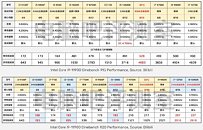Tuesday, December 22nd 2020

Intel 11th Gen Core "Rocket Lake-S" Processors Could Feature Similar PL2 Values to 10th Gen
Intel's 11th generation Core "Rocket Lake-S" desktop processors could feature similar Power Level values to their 10th Gen counterparts, according to a recent Core i9-11900 engineering sample benchmark leak posted to Chinese social media platform Bilibili. The i9-11900 (non-K) is a locked SKU that succeeds the i9-10900, and has a rated TDP of 65 W (which is also its PL1), but the PL2 value is reportedly 224 W, identical to that of the i9-10900. A recent report also predicted that individual 11th Gen SKUs have the same TDP (PL1) ratings as their 10th Gen counterparts, with locked SKUs rated at 65 W, and unlocked "K" and "KF" SKUs featuring 125 W.
The "QV1J" engineering sample for the i9-11900, which has been doing rounds with most leaks, has a nominal clock speed of just 1.80 GHz, an all-core Turbo Boost frequency of 3.80 GHz, and maximum (single-core) boost frequency of 4.40 GHz. The 8-core/16-thread processor ends up performing slightly better than the i9-9900K at Cinebench R15 and Cinebench R20, although not nearly enough to qualify as a generational performance uplift. The i9-11900 ES was tested on a motherboard based on the next-gen mid-range Intel B560 chipset.
Source:
VideoCardz
The "QV1J" engineering sample for the i9-11900, which has been doing rounds with most leaks, has a nominal clock speed of just 1.80 GHz, an all-core Turbo Boost frequency of 3.80 GHz, and maximum (single-core) boost frequency of 4.40 GHz. The 8-core/16-thread processor ends up performing slightly better than the i9-9900K at Cinebench R15 and Cinebench R20, although not nearly enough to qualify as a generational performance uplift. The i9-11900 ES was tested on a motherboard based on the next-gen mid-range Intel B560 chipset.


21 Comments on Intel 11th Gen Core "Rocket Lake-S" Processors Could Feature Similar PL2 Values to 10th Gen
It does not seem to preform any better and has 2 cores less then the one its following up....
Meanwhile a 5600x uses no more than 75w and blasts through any modern game with very high framerates (considering you are not hiting gpu bottleneck)
In all honestly, I dont think these CPUs Will bring anything to the table apart from Intel promoting "best gaming CPU" even if it Will be by 2% or 3% and using 130watts on the most CPU demanding games.
One thing to lookout for tho, is the new memory controller. If it can achieve low timings (c16or c18) at 4266mhz +, then yeah, the Margins can be Higher.
twicethrice the power consumption at multithread if I where to set it at allcore 38x multi @ cpu VID allthewhile socring 10% more?le: I ran mine locked at 44X cpu multiplier with hf info on the side.
We overclocked the last/last/last///last generation of processors some more this year guys buy them at the new exorbitant price and be kangs and stuff lol.
Oh by the way because we pushed them to the absolute limit at this point for you, you can't overclock them anymore your self.
They got on top by merit , mostly , only to thrash humanity after the kaby lake incident.
I expected them to be so on top that AMD would hold them a candle, how wrong I was. Complacency Lake at its best from Intel's finest.
Intel should be releasing 16 core chips.
I guess they want to force their base to buy xeon.
While the i9 seems terrible this time the i7 has a lot of potential if it's priced the same as the 10700k. We might get a new 8c CPU at a decent price again after AMD's price hike with no budget 8c option. Price for an 8c CPU went from 350€ to 500€ at launch for AMD. Hopefully the new i7 can fix this.
Moving to Threadripper requires more then a hardware change. It would probably require a move to Fedora and use of GGC and Eclipse to optimize.
I dont find anything wrong with a more clear delineation between HEDT platforms and mainstream. 90% of users can't utilize more than 6c/12t in the first place... and if you need more, you go hedt. Sorry amd shoved more c/t down peoples throat when most of those people can't even use it. ;)
For those ripping on Intel... if Intel can still keep performance parity with a 50% node disadvantage, think of how they will leapfrog AMD when they finally get a 7nm or 5nm node shrink. Arch improvements are much more difficult than node shrinks.
Right now we still have 4c4t which is what the dual core was a few years ago: obsolete even on the bottom... and on the very top we have 10+ cores that are obsolete for lack of memory bandwidth or just simply going unused.
But yeah... this whole Rocket Lake release... we keep hoping its really different this time, every time we hear of new Intel chips... we should know better by now. Everything they port back will fall into the same troublesome power budget restraint and if they use 10nm they can't sustain clocks to match 14nm performance.
For both ranges of chips now what you really have is 'great at burst' 'worse at everything else'. You're nearly buying a marketing slide.
Im still looking over to both Intel and Amd as to who will be the first to implement ddr5 standards.